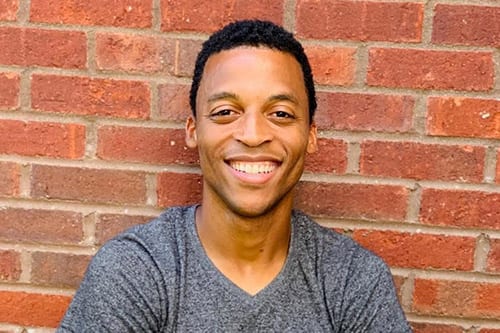
Kendrick Vaughn
MBA 16
Director, BreakLine Education
Louisville, KY
After a distinguished 12-year career in the United States Army, Kendrick Vaughn has taken on a new role. In his previous role as the Directory of Diversity Admissions and Outreach at West Point, his alma mater, Kendrick led the effort to matriculate three of the four most diverse classes in the U.S. Military Academy’s 200+ year history.
Now, he’s taken his talent and drive to BreakLine, a new company dedicated to increasing access to technical careers. Making this career shift is particularly significant to Vaughn at this time in history.
(23:12)
Until the recent series of tragic events, particularly the deaths of George Floyd, Ahmad Aubrey, and Breonna Taylor right there in his city, Vaughn considered his work in diversity as “a nice thing to do.” Then, the work was no longer about a professional decision, he said. “As a Black man, as a father, as a husband, as a human being… someday my kids are going to look back on this moment and they’re going to ask, ‘Dad, what did you do?’”
“To be here at this time, at this moment, it means a lot... It feels like we’re living in a new movement.”
Choosing to live and work in Louisville, Kentucky with his wife and two children, the tech education executive finds it imperative to take note of the world around him. He chose to join BreakLine education for one primary reason, to make an impact. Said Vaughn, “educational empowerment, the ability to build generational wealth, is literally one of the biggest civil rights issues of our generation.”
BreakLine is laser focused on its mission to increase the number of black and brown faces in the companies that are shaping the global tech systems. When high-ranking executives continue to believe that there’s a pipeline issue, that there isn’t enough diverse talent out there, his work becomes even more pertinent.
“In the short time that I’ve been in this space, I’ve seen an onslaught of diverse talent.”
Witnessing firsthand the amount of ignorance that still persists at the highest levels of business frustrates Vaughn. He’s most troubled by the stereotypes that this type of thinking perpetuates. He worries most about the young students who hear the assertions that they aren’t talented or that they aren’t equipped for key roles and then take that to heart. He spends much of his time with those companies that can shift the course of the discussion.
Fortunately, a number of organizations have stepped up to support the mission at his new company. Others may not move as quickly, sometimes finding a way to slow roll conversations and push the agenda down the road.
“It’s interesting seeing the range of conversations. I’m so thankful to individuals with courage to make change in a tangible, actionable way. To commit budgets, to commit resources, to say that we understand this is a challenge,” he said when discussing his work with these companies.
“We spent the majority of our time peeling back those misconceptions, peeling back through false narratives, peeling back just the layers of junk that have been poured onto some amazing young men and women.”
Effecting lasting change also requires Vaughn to convince the applicants and candidates that they have what it takes to succeed. To do so means undoing lifelong programming in some cases. After leaving Berkeley Haas in 2016, he led a team of five officers in creating a strategic plan to increase diversity. Vaughn and his team realized that they didn’t need a “magic wand” to turn individuals into stellar, perfect students. Instead, they needed most to convince them that their achievements and drive were enough to merit acceptance into the top military institution in the country. That directive sometimes meant refuting what the students heard from many naysayers, including their own college counselors who told them that they weren’t “West Point material.”
He didn’t shy away from the honest conversation about the difficulty of the road ahead. That’s part of the work, but it’s not meant to demoralize but instead meant to help the students plan.
“We spent the majority of our time peeling back those misconceptions, peeling back through false narratives, peeling back just the layers of junk that have been poured onto some amazing young men and women,” said Vaughn.
“Haas was a transformative experience...My classmates were some of the most fascinating people I’ve met in my entire life.”
Vaughn attributes a key lesson about representation to Marco Lindsay, who works at Haas DEI. Lindsay implored him to be visible in his community, showing others exactly what’s possible, right up close and personal. That makes the choices real and attainable.
What brought Vaughn to Berkeley Haas were its four defining principles. He felt pride in knowing that the institution deliberately and intentionally created its culture. “Five years removed from graduation, it has not disappointed on that promise yet.” He goes on to say that he continues to connect with his Haas classmates, some of the most brilliant minds he’s encountered, who still espouse its high standards. “It is not a bumper sticker, it is not a hashtag. … It is something that is woven into the fabric of the institution.”